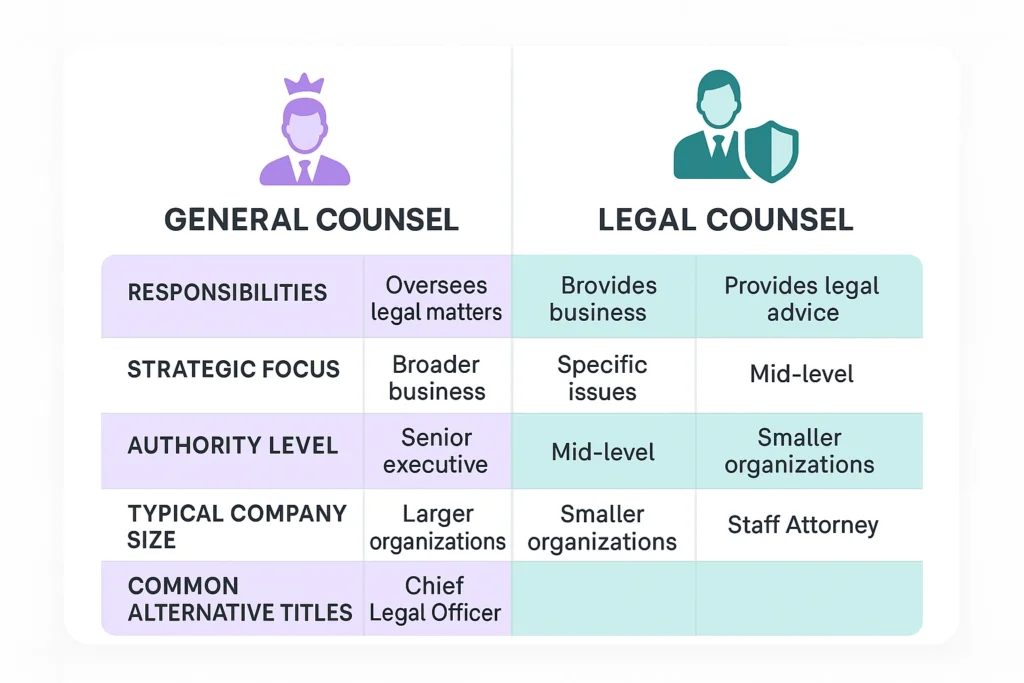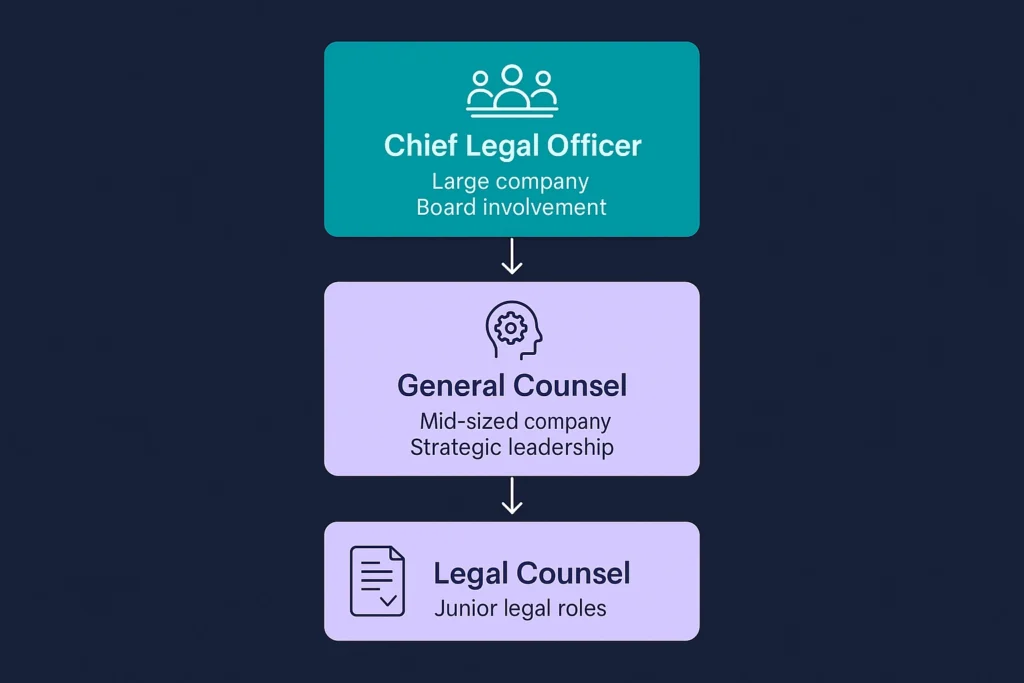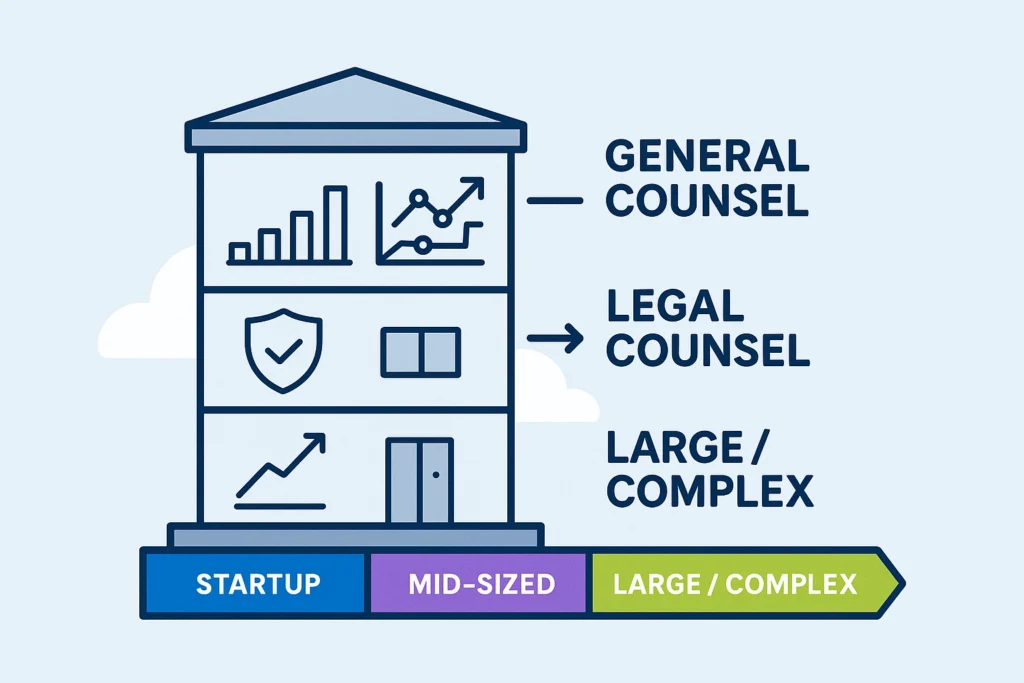General Counsel vs. Legal Counsel: Which Does Your Business Really Need?

- Last Updated: Jan 09, 2026
- 15 min read
- Arpita Chakravorty
Your company is taking off. The deals are getting bigger, the team is expanding, and the stakes are higher than ever. Suddenly, the contracts piling up look more intimidating, and someone in a meeting says the inevitable: “I think we need to hire a lawyer.”
But what does that actually mean? Do you need someone to review NDAs and sales agreements, or someone to help the leadership team navigate complex market risks? You’ve heard the terms “Legal Counsel” and “General Counsel” thrown around, but they often sound interchangeable.
Here’s the secret: they’re not.
Choosing between a Legal Counsel and a General Counsel is one of the most critical strategic decisions a growing company can make. It’s not just about hiring a lawyer; it’s about defining the role legal will play in your business’s future. Let’s clear up the confusion so you can make the right call.
What’s the Real Difference Between General Counsel and Legal Counsel?
At first glance, the titles seem similar. Both are lawyers working inside a company (known as “in-house”). However, the core difference lies in their scope, seniority, and strategic impact. Think of it as the difference between a specialist on the field and the head coach designing the entire season’s strategy.
A Legal Counsel is a hands-on lawyer responsible for managing specific legal tasks. They are the tactical experts on the front lines, drafting and reviewing contracts, ensuring regulatory compliance on a project level, and handling the day-to-day legal questions that pop up across the business. They are the “doers” who keep the company’s legal operations running smoothly.
Read how the Role of General Counsel extends beyond legal advice to shaping strategy, risk, and governance.
A General Counsel (GC), on the other hand, is the senior-most lawyer in the company. They are a strategic leader who manages the entire legal function and sits with the executive team. The role of general counsel is to protect the company by aligning legal strategy with overall business objectives, managing enterprise-wide risk, and leading the legal department—which includes any Legal Counsel on the team.
To make the distinction crystal clear, let’s look at their roles side-by-side. This comparison highlights how their responsibilities, focus, and authority differ within an organization.

Is a General Counsel a C-Suite Executive?
That’s a great question, and the answer reveals a lot about the evolution of the modern legal department. Yes, in most large or publicly traded companies, the General Counsel is considered a C-suite executive.
Historically, the top lawyer was seen as the “chief naysayer,” brought in to identify problems and stop risky ventures. Today, that role has transformed. The modern general counsel is a strategic business partner, expected to provide guidance that enables growth while managing risk.
This is why you increasingly hear the title Chief Legal Officer (CLO). While often used interchangeably with General Counsel, the chief legal officer title more explicitly highlights the role’s executive status and business-focused responsibilities. A CLO is unequivocally part of the core leadership team, contributing to major decisions about the company’s direction.
Understanding the hierarchy helps clarify these roles. A corporate legal department isn’t flat; it’s a structured team with a clear progression from tactical execution to strategic leadership. The GC or CLO sits at the very top of this structure.

As you can see, Legal Counsel is a foundational role. With experience and a shift toward strategic thinking, a Legal Counsel can advance to Senior Counsel, Deputy General Counsel, and ultimately, General Counsel. This structure ensures that both daily legal tasks and high-level strategy are handled effectively, often with support from a dedicated legal operations team focused on efficiency.
When Should Your Company Hire a General Counsel vs. Legal Counsel?
The answer has everything to do with your company’s stage of growth, complexity, and risk profile. It’s not about which role is “better,” but which is right for you, right now.
Think of building your legal team like constructing a building. You don’t start with the chief architect; you start with a solid foundation and add specialists as the structure grows more complex.
- Early-Stage Startup: At this point, you likely don’t need a full-time in-house lawyer. Your legal needs are sporadic and can be handled by an external law firm (outside counsel) on an as-needed basis for things like incorporation and fundraising.
- Growing Company: Once your business starts scaling, the volume of day-to-day legal work—customer contracts, vendor agreements, HR policies—skyrockets. The cost of sending everything to outside counsel becomes unsustainable. This is the perfect time to hire your first Legal Counsel. This person is a versatile generalist who can manage the daily workload, standardize processes, and become the go-to legal resource for the team.
- Scaling Company & Enterprise: As you enter new markets, develop new products, or consider an acquisition, your risks become more complex. You’re no longer just managing contracts; you’re navigating intellectual property landscapes, complex regulations, and potential litigation. This is when you need a General Counsel. They won’t just manage the legal work; they will build the legal department, implement robust contract risk management frameworks, and provide the executive team with high-level strategic advice to guide the company’s growth.

Putting It All Together: A Practical View
The key takeaway is this: Legal Counsel executes legal work, while a General Counsel strategizes and leads the legal function.
Your decision should be based on your primary business pain.
Is your pain tactical? Are you drowning in contracts and routine legal questions? You likely need a Legal Counsel.
Is your pain strategic? Are you facing complex risks, planning major corporate moves, or needing a legal voice in the boardroom? It’s time for a General Counsel.
In many organizations, however, it’s not about choosing one over the other — it’s about making sure both roles work in concert.
The Overlap: How Legal Counsel and GC Work Together
When both roles exist in a company, Legal Counsel and General Counsel form a powerful one-two punch. Legal Counsel manages the operational legal load — drafting agreements, handling compliance checks, and standardizing language — while the General Counsel provides strategic oversight, ensuring that every legal action supports the company’s broader goals.
The real magic happens when these roles are connected through unified processes and shared visibility. Strategic priorities from the GC inform the day-to-day work of the Legal Counsel, while real-time operational insights help the GC make informed decisions at the leadership table. This tight loop is where technology, particularly CLM solutions, becomes a force multiplier.
Without the right systems to connect strategy and execution, even the strongest legal teams encounter roadblocks.
Key Challenges Both Roles Face Without the Right Tools
Even highly experienced legal teams can struggle when processes are fragmented and information is siloed. Common pain points include:
- Missed obligations post-signature due to scattered contract storage.
- Inconsistent terms across different business units.
- High outside counsel costs from repetitive manual reviews.
- Deal delays caused by long review cycles and unclear approval flows.
These challenges impact both Legal Counsel and GCs — slowing down execution, increasing risk exposure, and eroding the business’s ability to act quickly in high-stakes situations.
Addressing these challenges isn’t just about working harder — it’s about transforming how legal work is done.
Watch our webinar GenAI in CLM: A Guide for In-House Counsel to see how AI transforms contract review, risk management, and legal strategy.
The Evolution of the Legal Department in the AI Era
The legal function is evolving from a reactive risk mitigator to a proactive, value-generating partner. AI is at the heart of this change.
From automated clause comparisons and risk detection to predictive analytics on contract performance, AI-powered tools help Legal Counsel work more efficiently and enable GCs to make sharper, data-driven decisions. This transformation allows legal to move in step with — or even ahead of — the business, delivering insights that shape strategy rather than just react to it.
Platforms like Sirion are at the forefront of this shift, providing contract intelligence built from billions of data points to help legal teams anticipate risk, negotiate better terms, and unlock the full value of their agreements.
Why a CLM Solution Is a Game-Changer for Both Legal Counsel and General Counsel
Whether you have a Legal Counsel focused on tactical execution or a General Counsel driving strategy, one truth remains: neither role can perform at their best without the right technology to manage the company’s growing contract universe.
For Legal Counsel, a contract lifecycle management (CLM) platform streamlines the heavy lift of day-to-day work—drafting, reviewing, redlining, and tracking agreements—so they can work faster and with fewer errors. Automated workflows, clause libraries, and AI-powered search ensure they’re not reinventing the wheel for every contract, while real-time collaboration tools help them avoid bottlenecks.
For General Counsel, a CLM solution unlocks the visibility and insights needed to guide the business. From portfolio-wide risk dashboards to compliance tracking and value leakage monitoring, they get the data to make confident, strategic decisions. Integrated analytics mean GCs aren’t relying on gut feel—they have measurable indicators of contract performance and risk exposure.
This is where Sirion stands out. As an AI-native CLM platform, Sirion goes beyond storage and workflow automation. It delivers contract intelligence—trained on billions of data points from millions of contracts—so your legal team can spot risks, negotiate better terms, and realize more value from every agreement. Whether you’re building your first in-house legal capability or leading a global legal department, Sirion equips you with the speed, control, and foresight to turn contracts into a competitive advantage.
Discover how Contract Management Software for Legal Department streamlines reviews, cut risks, and drives smarter business decisions.
Your Next Step in Building a Future-Ready Legal Team
Choosing between a General Counsel and a Legal Counsel is far more than a hiring decision—it’s a declaration of your company’s maturity and ambition. By understanding the distinct value each role brings, you can ensure your business has the right legal guidance for the journey ahead.
As your company grows, the legal function will become increasingly integrated into your core business strategy. The right leader, supported by the right processes and technology, will not only protect your company but also help accelerate its success. Embracing modern legal ops best practices and powerful legal solutions will be key to unlocking that potential.
Frequently Asked Questions (FAQs)
How does outside counsel work with an in-house team?
They work as partners. The in-house team, led by the GC, handles the majority of the company’s daily legal needs because they have deep knowledge of the business and its goals. Outside counsel is typically engaged for highly specialized matters that require deep, niche expertise (like a major M&A transaction or patent litigation) or to handle a temporary overflow of work.
What are typical salary expectations for these roles?
Salaries vary dramatically based on industry, company size, and geographic location. As a senior executive, a General Counsel’s compensation is significantly higher and often includes bonuses and equity in the company. A Legal Counsel’s salary is typically benchmarked against other experienced lawyers in the same market, but is generally lower than a GC’s compensation package.
What industries most often hire General Counsel early in their growth stage?
Sectors with high regulatory complexity — such as finance, healthcare, energy, and technology — tend to bring on a General Counsel sooner. This is because the cost of legal missteps in these industries can be extremely high, and proactive legal oversight is critical for long-term success.
How do legal operations teams support Legal Counsel and GCs?
Legal operations teams handle the business side of legal work — managing budgets, technology, vendor relationships, and data analytics. By streamlining processes and implementing tools like contract lifecycle management (CLM) systems, they free up Legal Counsel and GCs to focus on legal analysis, strategic risk management, and high-value negotiations.
Are there certifications or professional organizations for in-house lawyers?
Yes. Many in-house lawyers join associations like the Association of Corporate Counsel (ACC) or pursue certifications such as the Certified In-House Counsel (CIC) credential. These programs offer resources, networking, and training tailored to the unique challenges of corporate legal work.
How does company size influence the legal department structure?
Smaller companies often have a lean legal team or even just one in-house lawyer handling a wide range of tasks. As companies grow, the legal department typically evolves into specialized roles — such as compliance officers, IP counsel, and litigation specialists — all reporting up to the General Counsel.
What role does technology play in modern legal departments?
Technology enables legal teams to manage high volumes of work efficiently, improve compliance, and gain actionable insights from contract data. From document automation to AI-driven contract analysis, these tools help Legal Counsel and GCs work faster and make better-informed decisions.

Arpita has spent close to a decade creating content in the B2B tech space, with the past few years focused on contract lifecycle management. She’s interested in simplifying complex tech and business topics through clear, thoughtful writing.
Additional Resources

The Impact of AI for Legal Ops: Types, Benefits and Risks

